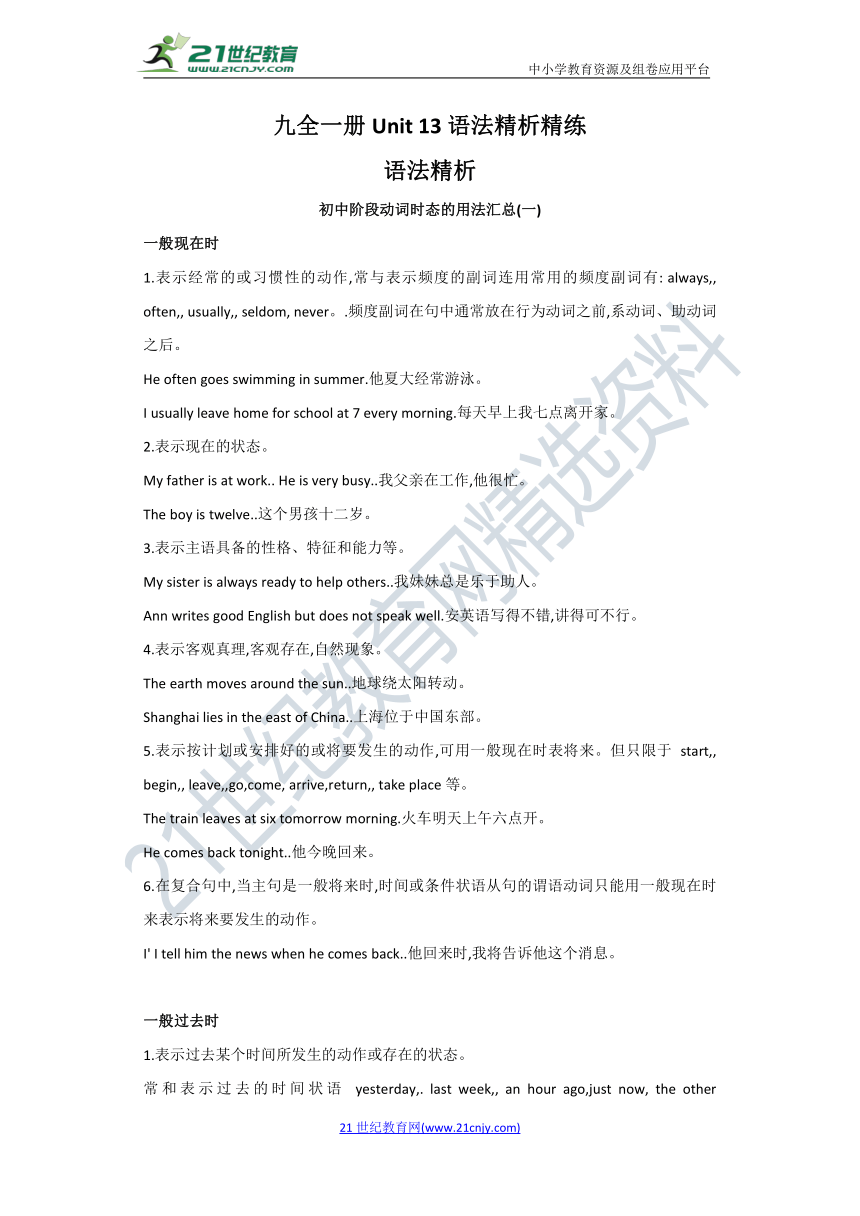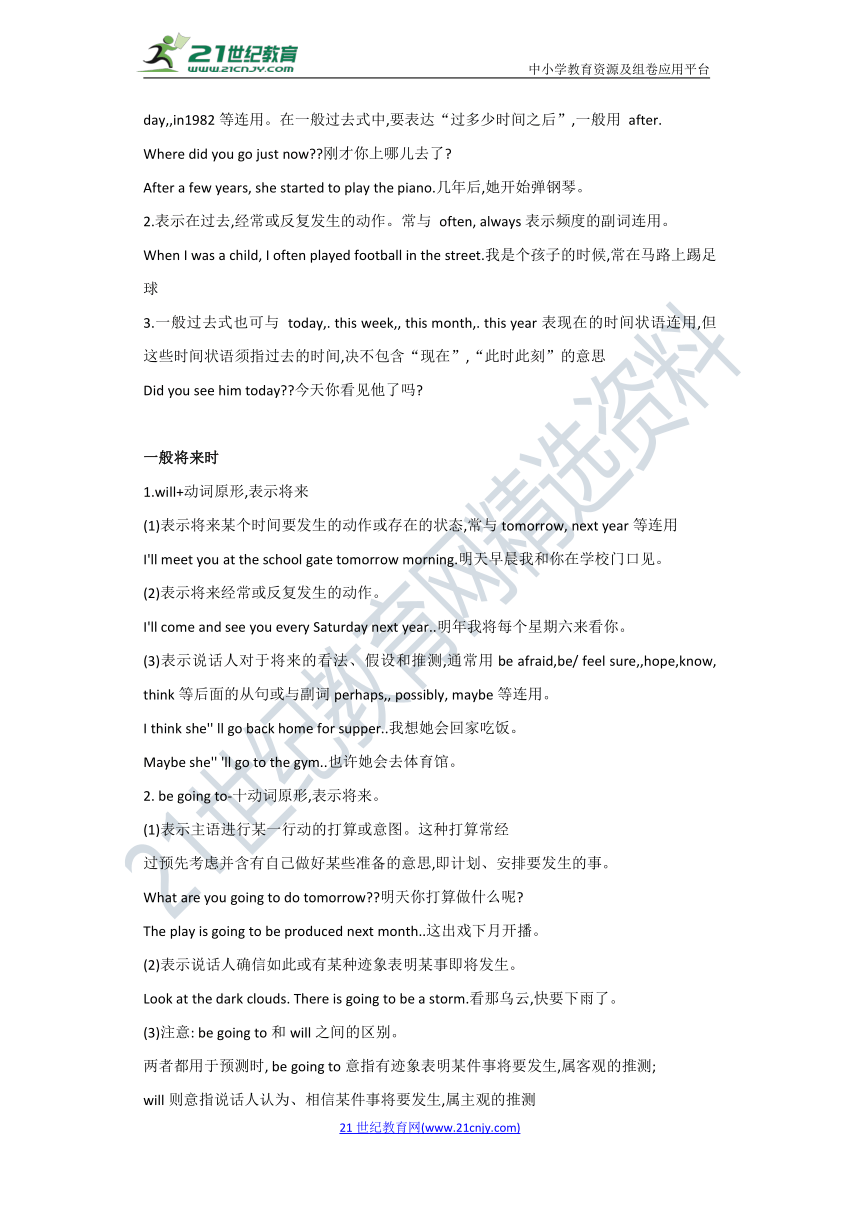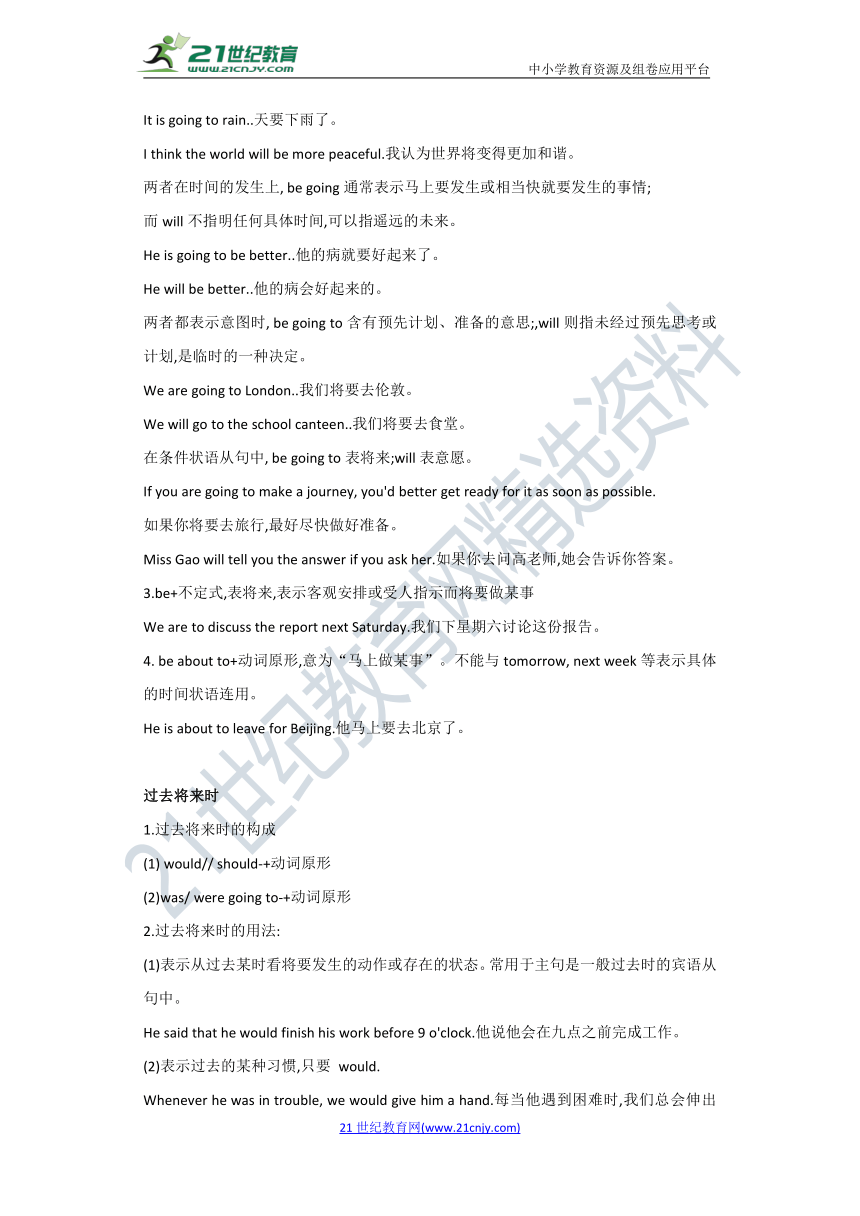Unit13 We're trying to save the earth!语法精析精练+答案(暑假预习通用)
文档属性
| 名称 | Unit13 We're trying to save the earth!语法精析精练+答案(暑假预习通用) |  | |
| 格式 | zip | ||
| 文件大小 | 1.3MB | ||
| 资源类型 | 试卷 | ||
| 版本资源 | 人教新目标(Go for it)版 | ||
| 科目 | 英语 | ||
| 更新时间 | 2021-07-26 08:58:52 | ||
图片预览




文档简介
中小学教育资源及组卷应用平台
九全一册Unit
13语法精析精练
语法精析
初中阶段动词时态的用法汇总(一)
一般现在时
1.表示经常的或习惯性的动作,常与表示频度的副词连用常用的频度副词有:
always,,
often,,
usually,,
seldom,
never。.频度副词在句中通常放在行为动词之前,系动词、助动词之后。
He
often
goes
swimming
in
summer.他夏大经常游泳。
I
usually
leave
home
for
school
at
7
every
morning.每天早上我七点离开家。
2.表示现在的状态。
My
father
is
at
work..
He
is
very
busy..我父亲在工作,他很忙。
The
boy
is
twelve..这个男孩十二岁。
3.表示主语具备的性格、特征和能力等。
My
sister
is
always
ready
to
help
others..我妹妹总是乐于助人。
Ann
writes
good
English
but
does
not
speak
well.安英语写得不错,讲得可不行。
4.表示客观真理,客观存在,自然现象。
The
earth
moves
around
the
sun..地球绕太阳转动。
Shanghai
lies
in
the
east
of
China..上海位于中国东部。
5.表示按计划或安排好的或将要发生的动作,可用一般现在时表将来。但只限于
start,,
begin,,
leave,,go,come,
arrive,return,,
take
place等。
The
train
leaves
at
six
tomorrow
morning.火车明天上午六点开。
He
comes
back
tonight..他今晚回来。
6.在复合句中,当主句是一般将来时,时间或条件状语从句的谓语动词只能用一般现在时来表示将来要发生的动作。
I'
I
tell
him
the
news
when
he
comes
back..他回来时,我将告诉他这个消息。
一般过去时
1.表示过去某个时间所发生的动作或存在的状态。
常和表示过去的时间状语
yesterday,.
last
week,,
an
hour
ago,just
now,
the
other
day,,in1982等连用。在一般过去式中,要表达“过多少时间之后”,一般用
after.
Where
did
you
go
just
now??刚才你上哪儿去了?
After
a
few
years,
she
started
to
play
the
piano.几年后,她开始弹钢琴。
2.表示在过去,经常或反复发生的动作。常与
often,
always表示频度的副词连用。
When
I
was
a
child,
I
often
played
football
in
the
street.我是个孩子的时候,常在马路上踢足球
3.一般过去式也可与
today,.
this
week,,
this
month,.
this
year表现在的时间状语连用,但这些时间状语须指过去的时间,决不包含“现在”,“此时此刻”的意思
Did
you
see
him
today??今天你看见他了吗?
一般将来时
1.will+动词原形,表示将来
(1)表示将来某个时间要发生的动作或存在的状态,常与tomorrow,
next
year等连用
I'll
meet
you
at
the
school
gate
tomorrow
morning.明天早晨我和你在学校门口见。
(2)表示将来经常或反复发生的动作。
I'll
come
and
see
you
every
Saturday
next
year..明年我将每个星期六来看你。
(3)表示说话人对于将来的看法、假设和推测,通常用be
afraid,be/
feel
sure,,hope,know,
think等后面的从句或与副词perhaps,,
possibly,
maybe等连用。
I
think
she''
ll
go
back
home
for
supper..我想她会回家吃饭。
Maybe
she''
'll
go
to
the
gym..也许她会去体育馆。
2.
be
going
to-十动词原形,表示将来。
(1)表示主语进行某一行动的打算或意图。这种打算常经
过预先考虑并含有自己做好某些准备的意思,即计划、安排要发生的事。
What
are
you
going
to
do
tomorrow??明天你打算做什么呢?
The
play
is
going
to
be
produced
next
month..这出戏下月开播。
(2)表示说话人确信如此或有某种迹象表明某事即将发生。
Look
at
the
dark
clouds.
There
is
going
to
be
a
storm.看那乌云,快要下雨了。
(3)注意:
be
going
to和will之间的区别。
两者都用于预测时,
be
going
to意指有迹象表明某件事将要发生,属客观的推测;
will则意指说话人认为、相信某件事将要发生,属主观的推测
It
is
going
to
rain..天要下雨了。
I
think
the
world
will
be
more
peaceful.我认为世界将变得更加和谐。
两者在时间的发生上,
be
going通常表示马上要发生或相当快就要发生的事情;
而will不指明任何具体时间,可以指遥远的未来。
He
is
going
to
be
better..他的病就要好起来了。
He
will
be
better..他的病会好起来的。
两者都表示意图时,
be
going
to含有预先计划、准备的意思;,will则指未经过预先思考或计划,是临时的一种决定。
We
are
going
to
London..我们将要去伦敦。
We
will
go
to
the
school
canteen..我们将要去食堂。
在条件状语从句中,
be
going
to表将来;will表意愿。
If
you
are
going
to
make
a
journey,
you'd
better
get
ready
for
it
as
soon
as
possible.
如果你将要去旅行,最好尽快做好准备。
Miss
Gao
will
tell
you
the
answer
if
you
ask
her.如果你去问高老师,她会告诉你答案。
3.be+不定式,表将来,表示客观安排或受人指示而将要做某事
We
are
to
discuss
the
report
next
Saturday.我们下星期六讨论这份报告。
4.
be
about
to+动词原形,意为“马上做某事”。不能与tomorrow,
next
week等表示具体的时间状语连用。
He
is
about
to
leave
for
Beijing.他马上要去北京了。
过去将来时
1.过去将来时的构成
(1)
would//
should-+动词原形
(2)was/
were
going
to-+动词原形
2.过去将来时的用法:
(1)表示从过去某时看将要发生的动作或存在的状态。常用于主句是一般过去时的宾语从句中。
He
said
that
he
would
finish
his
work
before
9
o'clock.他说他会在九点之前完成工作。
(2)表示过去的某种习惯,只要
would.
Whenever
he
was
in
trouble,
we
would
give
him
a
hand.每当他遇到困难时,我们总会伸出援助之手。
现在进行时
1.现在进行时的构成:am/is/are+动词的现在分词
2.现在进行时的用法
(1)表示现在(指说话人说话时)正在发生或进行的动作。常与now,
right
now,
at
this
moment等时间状语连用。
We
are
waiting
for
you
now..我们正在等你。
(2)表示现阶段(说话前后一段时间内),一直在进行的动。说话时动作未必正在进行,但处于某种状态。
Mr.
Green
is
writing
another
novel..他在写另一部小说。(话时并未在写,只处于写作的状态
)
He
is
thinking
about
this
problem.这些天来他一直在考虑这个问题。
(3)表示反复发生的动作或持续存在的状态,常与
always,constantly,,
forever等词连用,往往带有说话人的主观色彩。
You
are
always
changing
your
mind..你老是改变主意
(4)表示渐变,这样的动词有:get,grow,
become,,tum,run,go,
begin等。
The
leaves
are
turning
red..叶子在变红。
It'
s
getting
warmer
and
warmer,.天越来越热了。
(5)表示按计划或安排要发生的动作。
表移动的终止性动词(come,go,
arrive,
leave,,
start,
begin,,return等),用于现在进行时,表示即将要发生的动作。
I'
m
leaving
tomorrow..明天我要走了。
The
train
is
arriving
soon..火车要到了。
一些持续性动词用于进行时,表将来,表示说话者对对方将要做的事情的一种关心。
Are
you
staying
here
till
next
week??你会在这儿呆到下周吗?
过去进行时
1.过去进行时的构成:was/were+动词的现在分词(v.ing)
2.过去进行时的用法:
(1)表示在过去某时刻正在进行或发生的动作,通常与表示过去的时间状语连用。
At
this
moment
yesterday,
I
was
packing
for
camp.昨天这个时候,我正在收拾东西去露营。
(2)表移动的动词,如come,go,
arrive,,
leave,,
start,,
begin,return等词的过去进行时,可以表示过去将要发生的动作。
She
told
me
that
she
was
going
to
Hainan
for
her
holiday.告诉我她将去海南度假。
(3)在含有时间状语从句的复合句中,表示一个过去的动作发生时或发生之后,另一个动作正在进行。
It
was
raining
when
they
left
the
station.他们离开车站时,正下着雨。
(4)在叙述或描写过去的事情时,过去进行时经常与其他过去时态,特别是一般过去时连用。但是过去进行时往往表示背景。
One
night,
he
was
typing
in
his
study.
Suddenly,
a
man
broke
into
his
house
and
cut
off
the
electricity
..一天晚上,他正在书房里打字。突然,一个人闯进屋来,切断了电源…
语法精练
Lucy
likes
going
skating
with
her
friends..(改写成否定句)
_________________________________________________________________________
Aunt
Li''
s
son
has
ten
toy
bears..(对画线部分提问)
______________________________________________________________________
His
watch
costs300yuan.(变成一般疑问句并作否定回答)
______________________________________________________________________
Yesterday
I
went
swimming..(改写成否定句)
______________________________________________________________________
He
was
born
in
Shanghai..(对画线部分提问)
______________________________________________________________________
Mrs.
Brown
is
going
to
buy
a
digital
camera..(对画线部分提问)
______________________________________________________________________
My
boss
is
flying
to
London
tomorrow..(用
often
i改写句子)
______________________________________________________________________
Sam
will
visit
Brazil
next
week..(变成一般疑问句)
______________________________________________________________________
Bruce
often
writes
letters
in
English..(用now改写句子)
______________________________________________________________________
They
are
surfing.(对画线部分提问)
______________________________________________________________________
答案
语法精练
1.
Lucy
doesn't
like
going
skating
with
her
friends.
2.
How
many
toy
bears
does
Aunt
Li's
son
have?
3.-Does
his
watch
cost
300
yuan?
-No,
it
doesn't.
4.
I
didn't
go
swimming
yesterday.
5.
Where
was
he
born?
6.
What
is
Mrs.
Brown
going
to
do?
7.
My
boss
often
flies
to
London.
8.
Will
Sam
visit
Brazil
next
week?
9.
Bruce
is
writing
letters
in
English
now.
10.
What
are
they
doing?
HYPERLINK
"http://21世纪教育网(www.21cnjy.com)
"
21世纪教育网(www.21cnjy.com)
九全一册Unit
13语法精析精练
语法精析
初中阶段动词时态的用法汇总(一)
一般现在时
1.表示经常的或习惯性的动作,常与表示频度的副词连用常用的频度副词有:
always,,
often,,
usually,,
seldom,
never。.频度副词在句中通常放在行为动词之前,系动词、助动词之后。
He
often
goes
swimming
in
summer.他夏大经常游泳。
I
usually
leave
home
for
school
at
7
every
morning.每天早上我七点离开家。
2.表示现在的状态。
My
father
is
at
work..
He
is
very
busy..我父亲在工作,他很忙。
The
boy
is
twelve..这个男孩十二岁。
3.表示主语具备的性格、特征和能力等。
My
sister
is
always
ready
to
help
others..我妹妹总是乐于助人。
Ann
writes
good
English
but
does
not
speak
well.安英语写得不错,讲得可不行。
4.表示客观真理,客观存在,自然现象。
The
earth
moves
around
the
sun..地球绕太阳转动。
Shanghai
lies
in
the
east
of
China..上海位于中国东部。
5.表示按计划或安排好的或将要发生的动作,可用一般现在时表将来。但只限于
start,,
begin,,
leave,,go,come,
arrive,return,,
take
place等。
The
train
leaves
at
six
tomorrow
morning.火车明天上午六点开。
He
comes
back
tonight..他今晚回来。
6.在复合句中,当主句是一般将来时,时间或条件状语从句的谓语动词只能用一般现在时来表示将来要发生的动作。
I'
I
tell
him
the
news
when
he
comes
back..他回来时,我将告诉他这个消息。
一般过去时
1.表示过去某个时间所发生的动作或存在的状态。
常和表示过去的时间状语
yesterday,.
last
week,,
an
hour
ago,just
now,
the
other
day,,in1982等连用。在一般过去式中,要表达“过多少时间之后”,一般用
after.
Where
did
you
go
just
now??刚才你上哪儿去了?
After
a
few
years,
she
started
to
play
the
piano.几年后,她开始弹钢琴。
2.表示在过去,经常或反复发生的动作。常与
often,
always表示频度的副词连用。
When
I
was
a
child,
I
often
played
football
in
the
street.我是个孩子的时候,常在马路上踢足球
3.一般过去式也可与
today,.
this
week,,
this
month,.
this
year表现在的时间状语连用,但这些时间状语须指过去的时间,决不包含“现在”,“此时此刻”的意思
Did
you
see
him
today??今天你看见他了吗?
一般将来时
1.will+动词原形,表示将来
(1)表示将来某个时间要发生的动作或存在的状态,常与tomorrow,
next
year等连用
I'll
meet
you
at
the
school
gate
tomorrow
morning.明天早晨我和你在学校门口见。
(2)表示将来经常或反复发生的动作。
I'll
come
and
see
you
every
Saturday
next
year..明年我将每个星期六来看你。
(3)表示说话人对于将来的看法、假设和推测,通常用be
afraid,be/
feel
sure,,hope,know,
think等后面的从句或与副词perhaps,,
possibly,
maybe等连用。
I
think
she''
ll
go
back
home
for
supper..我想她会回家吃饭。
Maybe
she''
'll
go
to
the
gym..也许她会去体育馆。
2.
be
going
to-十动词原形,表示将来。
(1)表示主语进行某一行动的打算或意图。这种打算常经
过预先考虑并含有自己做好某些准备的意思,即计划、安排要发生的事。
What
are
you
going
to
do
tomorrow??明天你打算做什么呢?
The
play
is
going
to
be
produced
next
month..这出戏下月开播。
(2)表示说话人确信如此或有某种迹象表明某事即将发生。
Look
at
the
dark
clouds.
There
is
going
to
be
a
storm.看那乌云,快要下雨了。
(3)注意:
be
going
to和will之间的区别。
两者都用于预测时,
be
going
to意指有迹象表明某件事将要发生,属客观的推测;
will则意指说话人认为、相信某件事将要发生,属主观的推测
It
is
going
to
rain..天要下雨了。
I
think
the
world
will
be
more
peaceful.我认为世界将变得更加和谐。
两者在时间的发生上,
be
going通常表示马上要发生或相当快就要发生的事情;
而will不指明任何具体时间,可以指遥远的未来。
He
is
going
to
be
better..他的病就要好起来了。
He
will
be
better..他的病会好起来的。
两者都表示意图时,
be
going
to含有预先计划、准备的意思;,will则指未经过预先思考或计划,是临时的一种决定。
We
are
going
to
London..我们将要去伦敦。
We
will
go
to
the
school
canteen..我们将要去食堂。
在条件状语从句中,
be
going
to表将来;will表意愿。
If
you
are
going
to
make
a
journey,
you'd
better
get
ready
for
it
as
soon
as
possible.
如果你将要去旅行,最好尽快做好准备。
Miss
Gao
will
tell
you
the
answer
if
you
ask
her.如果你去问高老师,她会告诉你答案。
3.be+不定式,表将来,表示客观安排或受人指示而将要做某事
We
are
to
discuss
the
report
next
Saturday.我们下星期六讨论这份报告。
4.
be
about
to+动词原形,意为“马上做某事”。不能与tomorrow,
next
week等表示具体的时间状语连用。
He
is
about
to
leave
for
Beijing.他马上要去北京了。
过去将来时
1.过去将来时的构成
(1)
would//
should-+动词原形
(2)was/
were
going
to-+动词原形
2.过去将来时的用法:
(1)表示从过去某时看将要发生的动作或存在的状态。常用于主句是一般过去时的宾语从句中。
He
said
that
he
would
finish
his
work
before
9
o'clock.他说他会在九点之前完成工作。
(2)表示过去的某种习惯,只要
would.
Whenever
he
was
in
trouble,
we
would
give
him
a
hand.每当他遇到困难时,我们总会伸出援助之手。
现在进行时
1.现在进行时的构成:am/is/are+动词的现在分词
2.现在进行时的用法
(1)表示现在(指说话人说话时)正在发生或进行的动作。常与now,
right
now,
at
this
moment等时间状语连用。
We
are
waiting
for
you
now..我们正在等你。
(2)表示现阶段(说话前后一段时间内),一直在进行的动。说话时动作未必正在进行,但处于某种状态。
Mr.
Green
is
writing
another
novel..他在写另一部小说。(话时并未在写,只处于写作的状态
)
He
is
thinking
about
this
problem.这些天来他一直在考虑这个问题。
(3)表示反复发生的动作或持续存在的状态,常与
always,constantly,,
forever等词连用,往往带有说话人的主观色彩。
You
are
always
changing
your
mind..你老是改变主意
(4)表示渐变,这样的动词有:get,grow,
become,,tum,run,go,
begin等。
The
leaves
are
turning
red..叶子在变红。
It'
s
getting
warmer
and
warmer,.天越来越热了。
(5)表示按计划或安排要发生的动作。
表移动的终止性动词(come,go,
arrive,
leave,,
start,
begin,,return等),用于现在进行时,表示即将要发生的动作。
I'
m
leaving
tomorrow..明天我要走了。
The
train
is
arriving
soon..火车要到了。
一些持续性动词用于进行时,表将来,表示说话者对对方将要做的事情的一种关心。
Are
you
staying
here
till
next
week??你会在这儿呆到下周吗?
过去进行时
1.过去进行时的构成:was/were+动词的现在分词(v.ing)
2.过去进行时的用法:
(1)表示在过去某时刻正在进行或发生的动作,通常与表示过去的时间状语连用。
At
this
moment
yesterday,
I
was
packing
for
camp.昨天这个时候,我正在收拾东西去露营。
(2)表移动的动词,如come,go,
arrive,,
leave,,
start,,
begin,return等词的过去进行时,可以表示过去将要发生的动作。
She
told
me
that
she
was
going
to
Hainan
for
her
holiday.告诉我她将去海南度假。
(3)在含有时间状语从句的复合句中,表示一个过去的动作发生时或发生之后,另一个动作正在进行。
It
was
raining
when
they
left
the
station.他们离开车站时,正下着雨。
(4)在叙述或描写过去的事情时,过去进行时经常与其他过去时态,特别是一般过去时连用。但是过去进行时往往表示背景。
One
night,
he
was
typing
in
his
study.
Suddenly,
a
man
broke
into
his
house
and
cut
off
the
electricity
..一天晚上,他正在书房里打字。突然,一个人闯进屋来,切断了电源…
语法精练
Lucy
likes
going
skating
with
her
friends..(改写成否定句)
_________________________________________________________________________
Aunt
Li''
s
son
has
ten
toy
bears..(对画线部分提问)
______________________________________________________________________
His
watch
costs300yuan.(变成一般疑问句并作否定回答)
______________________________________________________________________
Yesterday
I
went
swimming..(改写成否定句)
______________________________________________________________________
He
was
born
in
Shanghai..(对画线部分提问)
______________________________________________________________________
Mrs.
Brown
is
going
to
buy
a
digital
camera..(对画线部分提问)
______________________________________________________________________
My
boss
is
flying
to
London
tomorrow..(用
often
i改写句子)
______________________________________________________________________
Sam
will
visit
Brazil
next
week..(变成一般疑问句)
______________________________________________________________________
Bruce
often
writes
letters
in
English..(用now改写句子)
______________________________________________________________________
They
are
surfing.(对画线部分提问)
______________________________________________________________________
答案
语法精练
1.
Lucy
doesn't
like
going
skating
with
her
friends.
2.
How
many
toy
bears
does
Aunt
Li's
son
have?
3.-Does
his
watch
cost
300
yuan?
-No,
it
doesn't.
4.
I
didn't
go
swimming
yesterday.
5.
Where
was
he
born?
6.
What
is
Mrs.
Brown
going
to
do?
7.
My
boss
often
flies
to
London.
8.
Will
Sam
visit
Brazil
next
week?
9.
Bruce
is
writing
letters
in
English
now.
10.
What
are
they
doing?
HYPERLINK
"http://21世纪教育网(www.21cnjy.com)
"
21世纪教育网(www.21cnjy.com)
同课章节目录
- Unit 1 How can we become good learners.
- Section A
- Section B
- Unit 2 I think that mooncakes are delicious!
- Section A
- Section B
- Unit 3 Could you please tell me where the restroom
- Section A
- Section B
- Unit 4 I used to be afraid of the dark.
- Section A
- Section B
- Unit 5 What are the shirts made of?
- Section A
- Section B
- Review of Units 1-5
- Unit 6 When was it invented?
- Section A
- Section B
- Unit 7 Teenagers should be allowed to choose their
- Section A
- Section B
- Unit 8 It must belong to Carla.
- Section A
- Section B
- Unit 9 I like music that I can dance to.
- Section A
- Section B
- Unit 10 You're supposed to shake hands.
- Section A
- Section B
- Review of Units 6-10
- Unit 11 Sad movies make me cry.
- Section A
- Section B
- Unit 12 Life is full of the unexpected
- Section A
- Section B
- Unit 13 We're trying to save the earth!
- Section A
- Section B
- Unit 14 I remember meeting all of you in Grade 7.
- Section A
- Section B
- Review of Units 11-14
